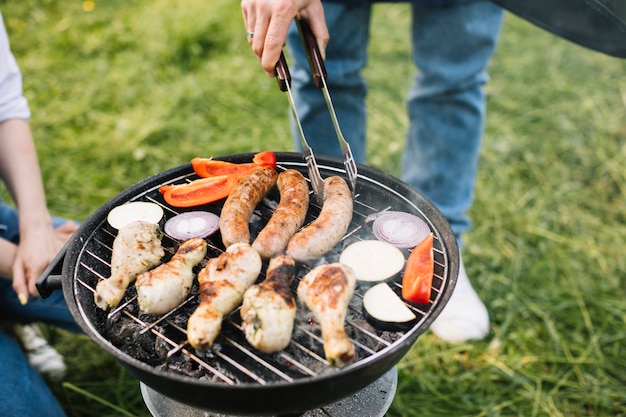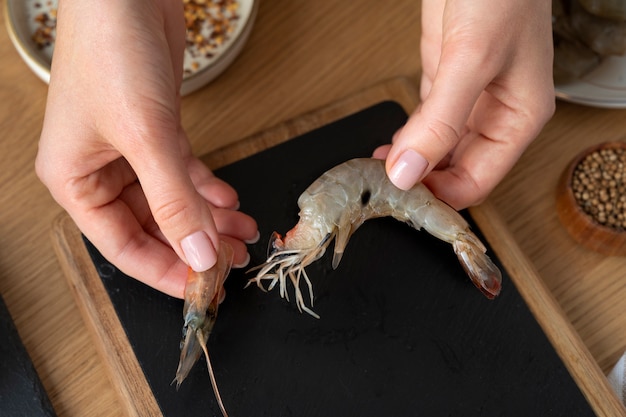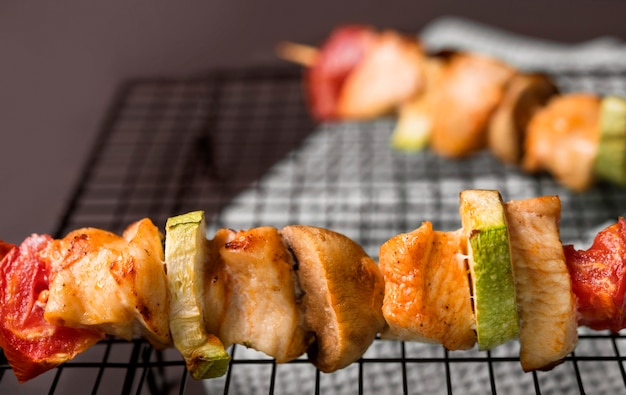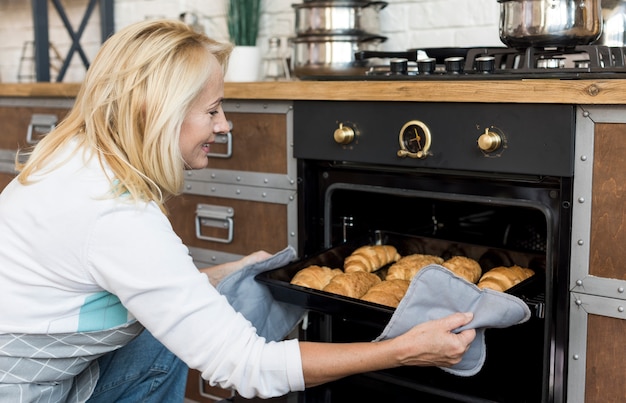Let’s talk shrimp, my friends. As a seasoned home cook, there's nothing quite like the smoky aroma and tender texture of perfectly grilled shrimp. It's a crowd-pleaser, a summertime staple, and a dish that always seems to impress. But, let's be honest, grilling shrimp can be a bit tricky. Overcook it, and you're left with rubbery, dry disappointment. Undercook it, and well, you've got a whole other set of problems. So, fear not, dear readers, because I'm about to spill the secrets to grilling shrimp like a pro, packed with tips and tricks I've learned over years of grilling adventures.
(Part 1) Picking the perfect shrimp

First things first, we need to choose the right shrimp. Imagine baking a cake with bad flour – wouldn't that be a disaster? The same principle applies to shrimp.
Choosing the Best Shrimp
Freshness is key: Look for shrimp that's fresh, firm, and smells clean. Avoid any that look mushy or have a fishy odor – that's a sure sign it's not as fresh as it could be. Head to a reputable fishmonger or supermarket to ensure you get the best quality.
Size matters: For grilling, I generally opt for medium-sized shrimp, usually around 16-20 per pound. They cook quickly and hold up well on the grill without becoming too tough.
Peeled and deveined, or not? That's entirely up to you. Personally, I prefer to buy shrimp that's already peeled and deveined. It's a timesaver, especially when you're eager to get those shrimp sizzling on the grill. But hey, if you enjoy a little extra prep, feel free to peel and devein yourself! It's not that difficult, and some find it a satisfying part of the process.
Freezing Shrimp for Future Grilling
Now, if you're not planning on grilling your shrimp immediately, don't worry. You can absolutely freeze them. Just make sure you freeze them properly so they don't turn into a watery mess.
Freeze in a single layer: This prevents them from sticking together and makes it easier to separate them later. You can use a baking sheet lined with parchment paper for this.
Use a freezer bag: Once they're frozen solid, transfer them to a freezer bag for long-term storage. Remember to squeeze out any excess air to prevent freezer burn.
(Part 2) Getting Your Grill Ready for Shrimp

You've got your shrimp sorted. Now, it's time to prepare your grill – the star of this shrimp show.
Cleaning Your Grill: Essential for Perfect Results
A clean grill is essential for perfect grilling results. It prevents your shrimp from sticking and allows for that beautiful char.
Give it a good scrub: Use a wire brush to thoroughly scrub the grill grates. If you're using a gas grill, preheat the grates to high heat for a few minutes before cleaning.
Oil the grill: Once your grill is clean and hot, brush the grates with a bit of oil. I prefer using a high-heat oil like avocado oil or grapeseed oil for this. This helps to prevent the shrimp from sticking and adds a touch of flavor.
Prepping the Shrimp: Unleashing the Flavors
Now, let's focus on those shrimp! There are a few ways you can prep them before they hit the grill.
Marinades: A Symphony of Flavor: Marinades are a fantastic way to infuse your shrimp with delicious flavors and keep them juicy. I love a simple marinade of olive oil, lemon juice, garlic, and fresh herbs. You can get really creative with your marinades too. Experiment with teriyaki sauce, Thai curry paste, or even a citrus-ginger concoction. Just be sure to marinate your shrimp for at least 30 minutes, but ideally for a few hours, to let the flavors really penetrate.
Seasoning: The Finishing Touches: Even if you're not marinating, you'll want to season your shrimp. Salt and freshly ground black pepper are essential. Don't be afraid to add other spices like paprika, cayenne pepper, or cumin. For a smoky kick, consider smoked paprika or a pinch of chipotle powder.
Skewers: Keeping It Together: If you're using smaller shrimp, threading them onto skewers can be a good idea. This keeps them together on the grill and makes flipping easier. Soak your skewers in water for at least 30 minutes before threading the shrimp to prevent them from burning.
(Part 3) The Art of Grilling Shrimp

Okay, we're almost there! Now it's time to grill those beauties.
Direct Heat vs. Indirect Heat: A Choice of Technique
The way you grill your shrimp will depend on what kind of cooked shrimp you desire.
Direct Heat: For Searing and Char: Direct heat is the way to go for searing those shrimp and getting that beautiful char. Think hot and fast – you want your grill to be nice and hot, around 450-500 degrees Fahrenheit.
Indirect Heat: Gentle Cooking: If you prefer your shrimp cooked a little more gently, with less char, indirect heat is the way to go. Move the shrimp to a cooler part of the grill or use a grill pan with indirect heat.
Timing is Everything: Avoiding Overcooked Shrimp
Shrimp cooks incredibly quickly, so keep a close eye on them to avoid overcooking.
cooking time: For medium-sized shrimp, aim for 2-3 minutes per side over direct heat. With indirect heat, you might need a few minutes longer, but keep an eye on them.
Don't Overcook!: The shrimp should be pink and opaque, with a slight spring to them when you press on them with a fork. If they're still translucent or mushy, they need more time on the grill.
(Part 4) Beyond the Basics: Tips and Tricks for Delicious Grilled Shrimp
We've covered the essentials, but now let's amp up those grilling skills with some additional tips and tricks.
Skewer Skills: Mastering the Art of Shrimp Skewers
If you're using skewers, here's how to do it right:
Soaking the Skewers: Before threading your shrimp, soak the skewers in water for at least 30 minutes. This helps to prevent them from burning on the grill and allows for even cooking.
Threading Evenly: Don't overcrowd the skewers. Give those shrimp a little breathing room to prevent them from sticking together.
Cooking Over Medium Heat: I find cooking skewers over medium heat is safer and allows for more even cooking.
Flavor Adventures: Experimenting with Different Flavors
Don't be afraid to get creative with your flavors:
Citrus Zest: A little zest of lemon, lime, or orange adds a bright, citrusy flavor to your shrimp.
Garlic: Garlic is a classic pairing for shrimp. Use fresh garlic cloves or add a dash of garlic powder to your marinade.
Herbs: Experiment with different herbs like parsley, thyme, oregano, basil, or even a touch of cilantro. Fresh herbs always enhance the flavor.
Spicy Kick: If you like it hot, add some chili flakes, cayenne pepper, or chipotle powder to your marinade for a fiery punch.
Grilling with Companions: Pairing Shrimp with Other Ingredients
Combine shrimp with other delicious ingredients for a complete and flavorful meal.
Veggies: Grilling shrimp with vegetables like bell peppers, onions, zucchini, or asparagus adds color, texture, and extra flavor.
Fruit: Pineapple and mango pair beautifully with grilled shrimp. The sweetness of the fruit complements the savory shrimp perfectly. Try grilling them on skewers together.
Cheese: Halloumi cheese is a fantastic addition to grilled shrimp. It melts beautifully and adds a salty, tangy flavor. Grill it along with your shrimp on skewers or alongside them on the grill.
(Part 5) Serving Up Deliciously Grilled Shrimp
Okay, your shrimp are perfectly grilled and smelling divine. Now it's time to serve them up!
shrimp scampi: A Classic and Simple Delight
Quick and Easy: Simmer your grilled shrimp in a garlicky, buttery sauce with white wine and lemon juice.
The Perfect Accompaniment: Serve it with pasta, rice, or crusty bread for a satisfying meal.
Grilled shrimp tacos: A Fun and Flavorful Twist
Delicious and Fun: Serve your grilled shrimp in warm tortillas with your favorite toppings.
Toppings Galore: Try avocado, salsa, sour cream, cilantro, shredded cheese, or a squeeze of lime juice.
Salads with a Shrimp Kick: Light and Refreshing
Light and Refreshing: Add your grilled shrimp to a salad for a hearty and flavorful meal.
Salad Ideas: Try a mixed greens salad with grilled shrimp, avocado, and a citrus vinaigrette, or a quinoa salad with grilled shrimp, bell peppers, and feta cheese.
(Part 6) Storing and Reheating: Keeping Those Shrimp Delicious
You've got your delicious grilled shrimp. But what do you do with leftovers?
Storing for Later: Refrigerate Properly
Keep it Cool: Store your grilled shrimp in an airtight container in the refrigerator for up to 3 days.
Don't Let it Sit Out: Keep those shrimp cold – you don't want any bacteria growing.
Reheating Your Shrimp: Bringing Back the Flavor
Back to the Grill: The best way to reheat grilled shrimp is to put it back on the grill for a few minutes. This will give it a fresh taste and warm it through.
Quick and Easy: You can also reheat shrimp in the oven or microwave. Just make sure it's cooked through before you serve it.
(Part 7) A Table for Shrimp: The Ultimate Shrimp grilling guide
Let's summarize the key points we've covered for a quick and easy reference.
| Topic | Details |
|---|---|
| Choosing Shrimp | Fresh, firm, clean smell; medium size (16-20 per pound) |
| Freezing Shrimp | Freeze in a single layer; use a freezer bag |
| Cleaning the Grill | Scrub with wire brush; oil the grates |
| Preparing the Shrimp | Marinate; season with salt, pepper, and other spices; thread onto skewers |
| Grilling the Shrimp | Direct heat (hot and fast) or indirect heat (medium heat, more time); 2-3 minutes per side |
| Serving the Shrimp | Shrimp Scampi, Grilled Shrimp Tacos, salads |
| Storing and Reheating | Refrigerate in airtight container; reheat on grill, in oven, or microwave |
(Part 8) FAQs: Your Grilled Shrimp Questions Answered
Now let's tackle some of those frequently asked questions.
What's the best way to tell if shrimp is cooked?
The shrimp should be pink and opaque, with a slight spring to them when you press on them. If the shrimp is still translucent or feels mushy, it's not cooked through.
What happens if I overcook the shrimp?
Overcooked shrimp will be rubbery and dry. It's crucial to cook them quickly over medium to high heat to prevent overcooking.
Can I grill frozen shrimp?
It's best to grill fresh or thawed shrimp. Frozen shrimp can become watery and mushy when grilled.
What should I serve with grilled shrimp?
There are endless possibilities! Some classic options include pasta, rice, couscous, salads, or grilled vegetables.
Can I marinate shrimp in anything besides oil and lemon juice?
Absolutely! You can use any type of marinade you like, just make sure it's flavorful and keeps the shrimp moist. Try marinating in teriyaki sauce, honey garlic sauce, or a Thai curry paste.
Remember, grilling shrimp is all about achieving that delicious char and tender texture. Follow these simple steps, and you'll be enjoying a fantastic meal in no time. Let me know how your grilled shrimp turns out – I'm always eager to hear about your culinary adventures!
Everyone is watching

Prime Rib Roast Cooking Time Chart: Per Pound Guide
Cooking TipsPrime rib roast. Just the name conjures images of lavish dinners, crackling fires, and hearty laughter. It’s ...

How Long to Bake Potatoes in the Oven (Perfect Every Time)
Cooking TipsBaked potatoes are a staple in my kitchen. They're incredibly versatile, delicious, and surprisingly easy to m...

Perfect Rice Every Time: The Ultimate Guide to Cooking Rice
Cooking TipsAs a self-proclaimed foodie, I've always been a bit obsessed with rice. It's the foundation of countless cuisi...

The Ultimate Guide to Cooking Asparagus: Tips, Techniques, and Recipes
Cooking TipsAsparagus. The mere mention of this spring delicacy conjures up images of vibrant green spears, crisp and burs...

Ultimate Guide to Cooking the Perfect Thanksgiving Turkey
Cooking TipsThanksgiving. Just the word conjures up images of overflowing tables laden with delicious food, the scent of r...
